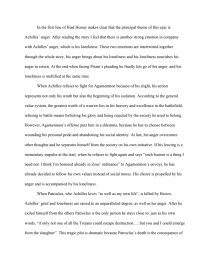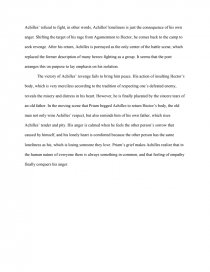The Anger and Loneliness of Achilles
Essay by zxyreadingessays • October 23, 2018 • Essay • 558 Words (3 Pages) • 1,169 Views
In the first line of Iliad Homer makes clear that the principal theme of this epic is Achilles’ anger. After reading the story I feel that there is another strong emotion in company with Achilles’ anger, which is his loneliness. These two emotions are intertwined together through the whole story, his anger brings about his loneliness and his loneliness nourishes his anger in return. At the end when facing Priam’s pleading he finally lets go of his anger, and his loneliness is mollified at the same time.
When Achilles refuses to fight for Agamemnon because of his slight, his action represents not only his wrath but also the beginning of his isolation. According to the general value system, the greatest worth of a warrior lies in his bravery and excellence in the battlefield, refusing to battle means forfeiting his glory and being rejected by the society he used to belong. However, Agamemnon’s offense puts him in a dilemma, because he has to choose between wounding his personal pride and abandoning his social identity. At last, his anger overcomes other thoughts and he separates himself from the society on his own initiative. If his leaving is a momentary impulse at the start, when he refuses to fight again and says “such honour is a thing I need not. I think I’m honored already in Zeus’ ordinance” to Agamemnon’s envoys, he has already decided to follow his own values instead of social mores. His choice is propelled by his anger and is accompanied by his loneliness.
When Patroclus, who Achilles loves “as well as my own life”, is killed by Hector, Achilles’ grief and loneliness are raised to an unparalleled degree, as well as his anger. After he exiled himself from the others Patroclus is the only person he stays close to, just as his own words, “if only not one of all the Trojans could escape destruction......but you and I could emerge from the slaughter”. This tragic plot is dramatic because Patroclus’s death is the consequence of Achilles’ refusal to fight, in other words, Achilles' loneliness is just the consequence of his own anger. Shifting the target of his rage from Agamemnon to Hector, he comes back to the camp to seek revenge. After his return, Achilles is portrayed as the only center of the battle scene, which replaced the former description of many heroes fighting as a group. It seems that the poet arranges this on purpose to lay emphasis on his isolation.
The victory of Achilles’ revenge fails to bring him peace. His action of insulting Hector’s body, which is very merciless according to the tradition of respecting one’s defeated enemy, reveals the misery and distress in his heart. However, he is finally placated by the sincere tears of an old father. In the moving scene that Priam begged Achilles to return Hector’s body, the old man not only wins Achilles’ respect, but also reminds him of his own father, which rises Achilles’ tender and pity. His anger is calmed when
...
...

